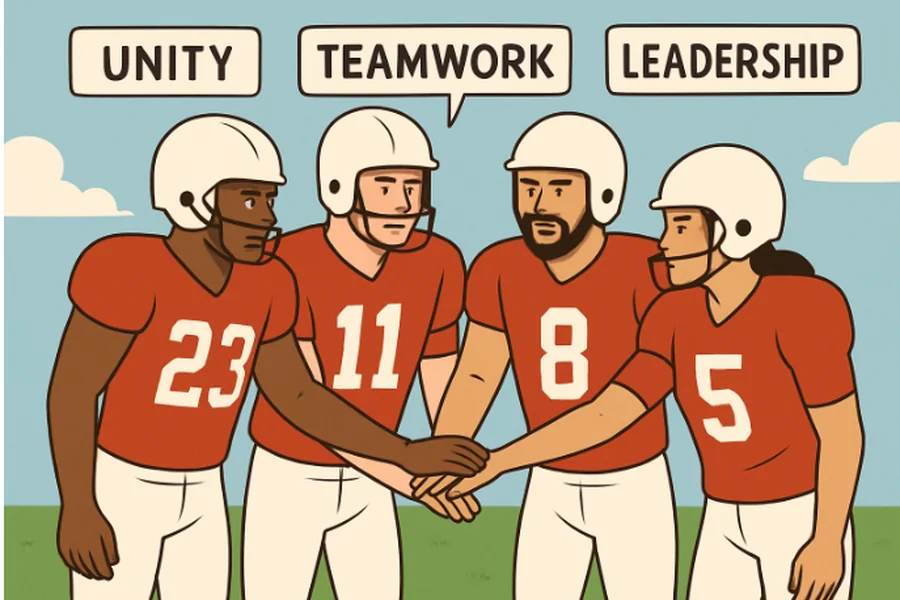The Basics of Teamwork in Football
Football is renowned for exemplifying true teamwork. Each play is a synchronized effort among eleven players working to achieve a shared objective, from quarterbacks to special teams. This level of collaboration requires not only skill but deep trust between teammates. For organizations and schools aiming to boost morale and unity, it’s not uncommon to book football motivational speaker professionals who can translate these teamwork lessons directly to business or educational settings. When athletes step onto the field, personal achievements are quickly eclipsed by the need to coordinate with others and strive collectively for victory.
Star power can capture headlines, but even the most celebrated athletes rely on the collective strength of their team. For example, an offensive lineman protecting the quarterback is just as critical to a team’s success as a running back making a big play. Those who play supporting roles, participate in drills, and maintain focus through practice demonstrate how every contributor matters. Research from the New York Times highlights how participation in football promotes cooperation and discipline—traits with lasting value far beyond the field. Coaches emphasize that harmony off the field directly correlates with performance during crucial moments of play, proving that relationships and trust built over time are the bedrock of any team’s resilience.
Qualities That Make Great Football Leaders
Exceptional football leaders strike a balance between vision, communication, and resilience. Whether mentoring rookies or guiding seasoned pros through challenging moments, effective leaders create a culture of accountability. They set high standards for themselves, leading by example and never shirking responsibility when situations get tough. Attributes such as adaptability, emotional intelligence, and decisiveness set these individuals apart—qualities that are also mirrored in strong leaders across various industries. Adaptable leaders can quickly adjust their tactics to meet evolving challenges, making informed in-game decisions that impact the entire team.
Team captains and coaches frequently serve as the emotional anchors of their organizations. They foster connection, encourage open dialogue, and model the perseverance needed to push through setbacks. Great leaders bring unity to diverse groups by ensuring each player feels valued and understands their unique role. According to a Psychology Today article, athletes who hone leadership skills on the field often see those same skills enhance their professional and personal relationships later in life. For these reasons, teams with strong leadership tend to build positive cultures that endure even after roster changes and shifting circumstances.
Famous Examples of Football Teamwork and Leadership
Some of football’s most iconic moments emerged from overwhelming teamwork and strong leadership. The New England Patriots’ comeback win in Super Bowl LI, for example, showed what’s possible when a group unites behind a common purpose despite daunting odds. Trailing 28-3 against the Atlanta Falcons, the Patriots’ comeback was not just about one player’s heroics; it was driven by unshakeable trust, disciplined execution, and smart collaboration at every level. Cool-headed play calling, trust in teammates, and a shared belief in their mission propelled the team to victory—a scenario applicable to any group aiming to overcome adversity. Read more in the official NFL Super Bowl LI recap.
In collegiate football, legendary coaches like Nick Saban and Bear Bryant are celebrated not only for their tactical brilliance but also for their consistent ability to inspire resilient teams. They instilled a sense of accountability and discipline that shaped their athletes into collaborators capable of overcoming any setback. Their influence extends beyond championships—they’ve shaped cultures of collaboration, accountability, and relentless pursuit of excellence. The stories of these leaders show how vision, preparation, and an unwavering commitment to team goals can produce extraordinary results. You can learn more about Bear Bryant’s legacy at Britannica and Nick Saban’s career at ESPN.
Translating Football Skills Into Life Success
The competencies nurtured on the football field are a launchpad for lifelong achievement. Team members quickly learn the importance of punctuality, adherence to regulations, and rising to daily challenges. Numerous studies highlight how skills such as punctuality, adaptability, and clear communication are hallmarks of football players both during and after their sports careers. Time management, discipline, and patience—key elements honed in practices and games—are just as relevant in classrooms or professional environments.
According to U.S. News & World Report, participants in collegiate sports often experience advantages in teamwork, leadership, and problem-solving in professional settings. The ability to recover from setbacks, take initiative, and function effectively within groups helps athletes transition more smoothly into various sectors, including business, education, and others. Employers frequently cite former athletes as adaptable, coachable, and naturally inclined to handle pressure.
The Science Behind Group Dynamics
Group performance thrives when foundations of trust, shared goals, and open communication are established. In football, these factors enhance players’ ability to communicate in high-pressure settings, supporting quick adaptations and success. Teams with clear expectations and consistent routines—like regular team meetings and strategy sessions—learn to anticipate each other’s moves and work together more fluidly.
Insights from sports psychology report that rituals—from pre-game huddles to post-game celebrations—bond teammates and reinforce a collective identity. These moments foster unity, enabling teams to focus on their strengths and challenges collectively rather than as isolated individuals. Research has shown that emotionally connected teams are better equipped to motivate one another and build a positive, results-oriented culture.
Applying Football’s Lessons Across Industries
Business leaders, educators, and nonprofit organizers consistently look to football for strategies on collaboration and motivation. Tactics such as breaking down roles, running practices, and evaluating performance echo widely in fields far removed from sports. Concepts like “calling an audible” or leveraging each team member’s strengths are now common metaphors in organizational leadership. This cross-pollination of ideas shows how football’s playbook can ignite creative problem-solving and drive positive culture changes in nearly any environment. Leaders in all spheres cite teamwork, discipline, and adaptability as critical for success.
How Teams Overcome Adversity Together
Every football season brings obstacles—injuries, losses, unexpected challenges. Instead of faltering, successful teams rally together, adapting their strategy and supporting one another as they overcome crises. These collective efforts foster grit and resilience, essential qualities that benefit not just football but also any situation requiring cooperation under pressure. The mindset that comes from weathering adversity together strengthens a group’s faith in itself and builds cultures geared for long-term success.
This resilience is a powerful model for organizations facing periods of change or uncertainty. By emphasizing adaptability, empathy, and collective purpose, teams in any field can learn to overcome setbacks together, ultimately emerging stronger than before—a lesson football illustrates so vividly season after season.
Summary and Real-World Applications
Football’s lessons about teamwork and leadership are universal. By championing communication, cultivating trust, and encouraging collaborative leadership, teams—whether on the gridiron or in the boardroom—achieve extraordinary results. Real-world applications of these principles foster stronger communities, high-performing workplaces, and empowered leaders ready to tackle any challenge. Ultimately, the lasting legacy of football’s approach to teamwork and leadership is its proof that together, diverse groups can accomplish what no individual could achieve alone.







